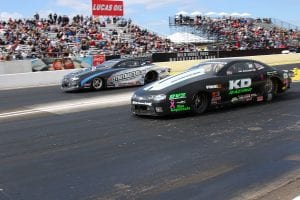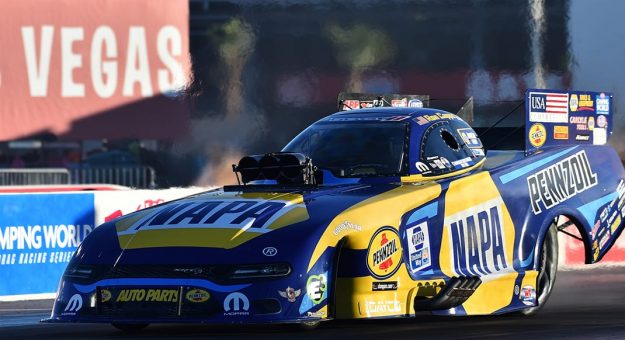“The NHRA is successful because of the show, because of the fans, because of the talent that is there, because of the uniqueness of this space,” Powers continued. “When people get the opportunity to experience it, they’re fans for life. So what the NHRA needs to continue to do is to bring new eyes to the sport, both on the corporate side and the fan side.
“On the corporate side, if I’m in the NHRA and I’m in the development department, I am entertaining. When things open up, I am doubling down on entertaining people, introducing people, creating authentic and long-lasting relationships with corporations and business owners. These are your customers. Come meet them,” she added. “Yes, they hunt. Yes, they fish. Yes, they camp. But there’s so much more. The NHRA fan is so much more than meets the eye.”
So are the challenges.
The Pro Stock class still has a collective sense of neglect, according to 2017 champion Bo Butner.
“Right now, we have nothing to sell anybody. We’re not on TV. If you’re on TV, you might be in the final for two-and-a-half minutes,” Butner explained. “But we really have nothing to sell, other than the one-on-one with the fans. Unfortunately, big business wants to see themselves on TV. That’s going to have to change for this sport.”

Top Fuel racer Lex Joon complimented NHRA officials, but the 2005 FIA (European) champion still has concerns.
“It’s positive Camping World came onboard. I can see the owner, Marcus Lemonis, will help the sport grow,” Joon said. “He is a smart businessman and I believe he is eager to help our sport in many ways. The deal NHRA made with FOX will help to promote our sport and attract new eyeballs and will help us to find marketing partners. NHRA did a good job managing and negotiating the COVID regulations, which will help us to keep going into 2021. I see the 2021 racing schedule is put together in a way we have to spend less money traveling from race to race when doing back-to-back races.”
Still, challenges remain.
“It’s pretty challenging for small-budget teams to run weekend after weekend because of a lack of hired crew members to service the car and parts like the big-funded teams,” Joon explained. “The question is if I see any signs regarding more affordable racing. I know the intent is to make it more affordable. The problem is that it’s a balancing act between the big teams with the big budgets and the small independent teams who NHRA can’t do without to keep the fields attractive for fans to buy tickets.
“NHRA feels that keeping 17 races on a one-day qualifying level saves money. Sure, the big teams are saving two runs per weekend on parts and wear and tear. The small-budget teams never make four qualifying runs, anyway. For example, we normally choose to do one run a day, preferably when the runs are live broadcast through FOX. We won’t save money by only qualifying on Saturday. It costs us more, because we need more crew to make the turnarounds in time between the runs on Saturday. In the meantime, we receive less prize money.”
Powers echoed the sentiments of so many fans when she said, “I’m so grateful Marcus Lemonis did this. We all love our sport, and it deserves this kind of attention.”
Lemonis deflected the praise.
“I’ve told a lot of people this: We stepped up because we want to be supportive, but it’s also a business decision, right?” he said. “And so when people say, ‘Thank you,’ my response is ‘You’re welcome — keep in mind the best way to thank me is to support our business. If you have an RV lifestyle, please support us, because if you don’t, when it comes time to renew it or extend it, I’m going to look at the economics and say: What did I get out of this?’ And as a steward of a company, you’ve got to be able to justify it economically. And as much as we don’t like the fact it’s always business, that’s the reality of it.”
